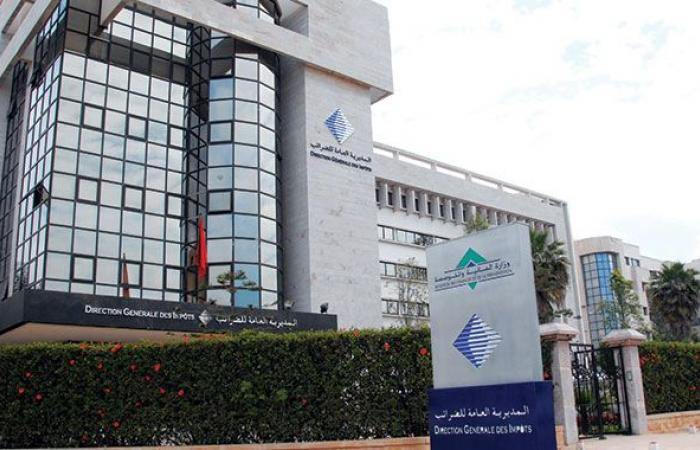Details of the 2023 activity report of the Directorate General of Taxes (DGI)
Finances. Overall gross tax revenues amounted, for 2023, to 209,032 MDH, an increase of 6.7% compared to 2022. The objective of the 2023 Finance Law was achieved to the extent of 100.2%.
All the objectives of the 2023 Finance Law in terms of taxation have been achieved. This is what emerges from the 2023 activity report of the Directorate General of Taxes (DGI). In detail, gross tax revenue generated by corporate tax comes first with 67,274 MDH, or 32.2% of overall revenue and an increase of 1.6% compared to 2022. Corporate tax income, value added tax and registration and stamp duties generated respective revenues of around 54,328 MDH, 51,042 MDH and 24,113 MDH. They thus display annual changes of 6%, 11% and 9%. Thus, the objectives set by the 2023 Finance Law for gross revenue from corporate tax, income tax, value added tax and registration and stamp duties have been achieved. .
The balance sheet for the year 2023 in terms of reimbursements, reliefs and restitutions liquidated amounts to 18,360 MDH, or 3.7% more than in 2022. The rate of achievement of the objective established by the law of Finances is thus of the order of 101.5%.
By type of tax, value added tax refunds represent the largest expenditure item with a share of 89%. The shares of corporate tax and income tax refunds are as to them, respectively, of the order of 8% and 2%. The target objective of the FL 2023 concerning the reimbursement of Value Added Tax was achieved at 103%. As for expenses relating to IS, IR and surcharges and other taxes, they were carried out, respectively, to the tune of 95%, 83% and 70%. Net tax revenue in 2023 stood at 190,672 MDH, or 6.9% more than in 2022. The achievement of the objectives of the 2023 Finance Law is thus of the order of 100%. Net revenues in 2023 for corporate tax, income tax, value added tax and registration and stamp duties are respectively of the order of 65,840 MDH, 53,947 MDH, 34,700 MDH and 24,113 MDH.
Their respective shares are thus 34%, 28%, 18% and 12%. In annual terms, net revenues from corporate tax, income tax, value added tax and registration and stamp duties increased by around 0.3%, 6%, 19% and 9% respectively. The targets set by the 2023 Finance Act for corporate tax, income tax and registration and stamp duties have been achieved. As for the targets set for value added tax, they have been achieved at 98.4%. It should be noted that the performance of the General Directorate of Taxes in terms of compliance resulted in the mobilization of additional revenue of 14,056 MDH, or 7% more than in 2022. By type of tax, these revenues are generated up to 76.5% by corporate tax, income tax and value added tax.
Tax litigation
Tax litigation mainly concerns challenges to taxes issued. Its processing takes place either at the level of the tax administration (administrative litigation), or at the level of arbitration commissions (Local Taxation Commissions, CLT) and National Tax Appeal Commission (CNRF). Judicial litigation occurs in the event of non-resolution of the dispute. Improving the management of tax disputes is part of the reforms of modernization, simplification and improvement of relations with taxpayers. “The automatic reliefs without prior complaints are carried out spontaneously by the General Directorate of Taxes in order to resolve errors that occurred during the issuance of various taxes, in accordance with the legislative and regulatory provisions in force. For 2023, the number of these reductions amounts to 1,480 for a value of 37.6MDH,” we read in the report. And added: “The management of disputes at the tax administration level aims to preserve the rights of disputing taxpayers and to bring a definitive settlement to the disputes between them, before any recourse to judicial authorities.
The investigation of complaints is based on the re-examination, by the DGI, of the regularity of the contested taxes. By type of tax, housing tax and municipal services tax, professional tax and income tax account for 57% of the files filed. Decreases of 35% and 10% concerned TH/TSC and income tax while files relating to TP experienced an increase of 5%. The number of files created for 2023, following taxpayers’ complaints, amounts to 78,916, a decrease of 16% due to the liquidation of 79,276 files. According to the same source, 70,377 files were created and liquidated during the year. Their share of all liquidated files increased from 82% in 2022 to 89% in 2023, or 7 points more. As for performance in terms of speed of processing, it resulted in the liquidation of 54,364 files within one month of their submission, which represents 69% of all files liquidated in 2023, an improvement. by 6 points compared to 2022.
The stock of claims amounted to 9,132 at the end of 2023, the lowest stock recorded over the last 5 years, down 53% compared to 2022. It consists of 55% of claims relating to TH/TSC, professional tax and income tax, the stocks of which recorded respective annual decreases of 81%, 43% and 59%. In order to improve the handling of claims in terms of quality and speed of processing, several functionalities have been implemented, including those dedicated to requests and processing of remissions, in particular in terms of alert management, categorisation of claims and implementation of the reference framework of legal texts (CGI-CRCP, etc.). In addition, the functional coverage has also been extended to cover new taxes and duties such as the Single Professional Contribution “CPU” and the Annual Special Tax on Vehicles “TSAV”. In addition, the quality and consistency of data and processing has been improved.
“Finally, the integration of the administrative litigation module with the other modules of the Integrated Taxation System has been improved, in particular through interconnections with the verification, legal litigation, recovery and taxpayer file modules, thus allowing the manager to “have better visibility on the tax regularity of the disputer in terms of deposit and payment, on its files currently being verified, as well as on the existence of a possible legal recourse for the same contested obligation”, concludes the DGI.
Tax audit
Modernisation. Protecting the integrity of the tax system is partly based on the right of control assigned to the Directorate General of Taxes. In this respect, the DGI identifies and reminds defaulters in filing declarations and carries out document or on-site checks to ensure their sincerity. The modernization of tax control within the DGI is mainly based on the continuous improvement of its information system (SIT control module), the updating of its risk matrix and the efficient use of its Data. In addition, the reminder of defaulters handled electronically in the reminder module of the Integrated Taxation System (SIT), has undergone a set of improvements for 2023, in particular concerning the automatic generation of failures to declare the Single Professional Contribution (CPU) and the annual declaration of property income as well as the automated printing of second reminder letters. The document control consists of the critical examination, by the DGI, of the declarations on the basis of the information and documents in its possession. The objective is to ensure the sincerity of the declarations filed and to rectify, where appropriate, errors, inadequacies, omissions or concealments. For the year 2023, 55,596 files were subject to a document check, an increase of 17% compared to 2022. Individuals are the top taxpayers checked (57%).






